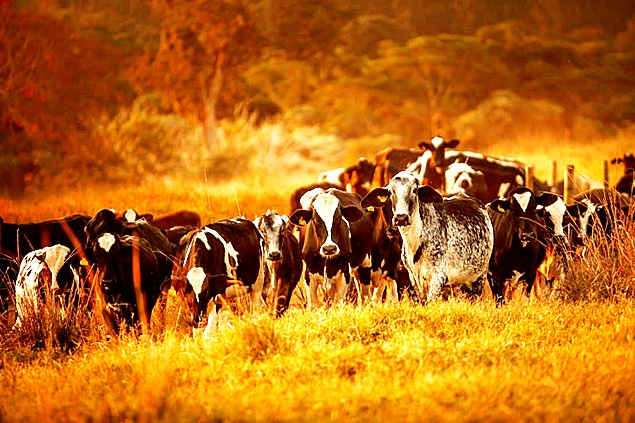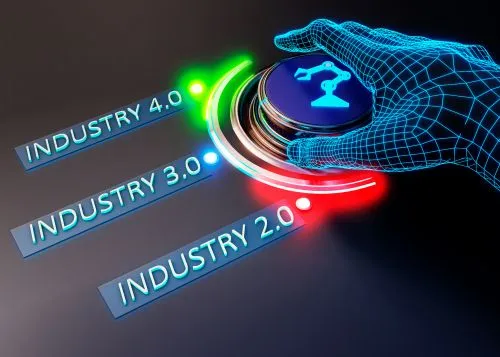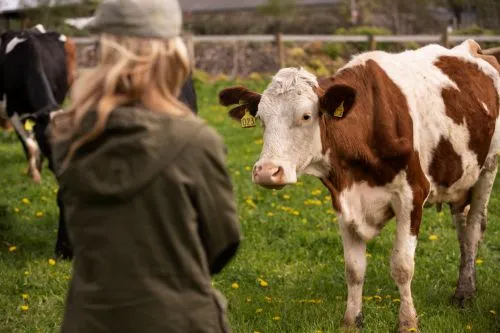1855

In the conditions where farmers are facing pressures to adopt more sustainable agricultural practices - or to transition to a completely different agricultural system - who should support producers during their transition? In the UK, the responsibility largely falls on the shoulders of all stakeholders in the agri-food sector, but some have a more significant role to play, as argued in an analysis published by the Food Ethics Council, a British think tank specializing in issues related to ethical eating and sustainability in food and agriculture.
Profit and Responsibility
The launch of the 36-page document follows a two-year project that involved workshops and conversations between the think tank and stakeholders in the dairy sector, including milk buyers, processors, and retailers, with a focus on understanding farmers' aspirations and the barriers to transitioning to agricultural systems perceived as more ethical - such as pasture-fed, organic, or regenerative.
The report shares actions that can support this change throughout the entire value chain, with a key focus on processors and retailers, who are seen as having the greatest influence in this area.
During the project, the think tank identified the main barrier to change as the tension between balancing the operation of a profitable dairy business with responsibilities towards the environment, animal welfare, and farmer well-being.
According to Tesni Clare of the organization, many farmers "feel trapped in a system that rewards them for volume-based production rather than for value-based products created in line with their values - and those of society."
"We think of it as a treadmill," she opened. "Over time, dairy farmers have been forced to invest in infrastructure to keep up with what the sector demands.
"We are now in a situation where many farmers would like to make changes in how they farm, but are financially locked in with large debts and potentially blocked assets."
Dairy farmers have long operated on thin profit margins; for many, this is the nature of the beast. But allowing a transition to different agricultural systems would require action from the entire agri-food chain; from processors and retailers to consumers and the government.
"It is necessary to stimulate both nature-friendly agriculture, with a secure market and fair prices, and to financially support farmers in the transition phase," Clare explained. "Even if farmers can make a profitable business out of more ecological practices, flexibility is needed in the interim transition phase. This is a significant barrier to change at this time."
Balancing Power
One area for improvement is transparency at the retail level. Clare says that retailers face pressures to keep prices low due to competition, while there is little visibility on different milk production systems, such as pasture-fed and calf at foot. At the consumer level, milk is still one of the most wasted products in the UK, with 300,000 tons thrown away each year.
"Society's perception of milk is broken, with the true cost of production rarely represented on supermarket shelves," Clare explained.
"We have witnessed a 'race to the bottom' over the past decade, with milk now often being sold as a loss leader. It may be necessary for the government to regulate leader losses and prices below the cost of production, to help retailers who would like to stop losses but currently struggle to make the first move due to competition."
She added that underlying all these challenges is "a profound imbalance of power - possibly from unfair contracts - between farmers, processors, and retailers, leading to a lack of trust, poor communication, and a disproportionate spread of risk in the sector."
This paints a rather bleak picture of the industry - how much disconnect does the think tank see in UK milk production? Well, it's not all bad, Clare suggested. "There are certainly different experiences within the sector regarding relationships between producers and buyers.
A lack of understanding
"However, many farmers we've spoken to have felt there has been a lack of understanding, especially from retailers, about the barriers and challenges they face in changing their practices. Years of poor communication along the value chain have led to mistrust, and many farmers feel they cannot trust their buyers to help them through the transition demanded by the sector. That said,
we approached processors specifically regarding exclusivity in contracts, and were told there tends to be flexibility if farmers were to approach and ask. This highlighted to us the real need to encourage space for open dialogue.
"Unfortunately, due to limited access to contracts - there may only be one of two processors in a certain geographic area - the fear farmers face of potentially losing their contract is very real and has made some feel unable to speak up for fear of being 'labelled as difficult' or even having a 'red mark put next to their name.'
At the same time, there are areas where stakeholders align, such as the collective desire to improve the sector's environmental sustainability, animal welfare record, and to encourage a new generation of farmers to mitigate the labor shortage. "However, defining whose responsibility it is to make changes is contentious and has sometimes led to a lack of action," Clare added.
Farmers' willingness to change varies
But what do farmers think about transitioning to different agricultural systems? Clare said that experiences, values, and perspectives "vary greatly" - generally, newcomers are more open to less conventional farming methods, such as operating calf at foot systems or setting up micro-dairies with doorstep deliveries. "But newcomers are often free to explore these types of business models because they are not locked into more conventional models due to historical debts," she said.
"We also found that some of the farms that made the most radical changes to their systems were significantly influenced by people who were not from an agricultural background or the dairy industry and, therefore, were new, curious, and sometimes critical of the sector.
"In the case of those who have been working in the dairy industry for a long time, there may be a lack of willingness to question the status quo and to view the business beyond the pure ability to make a profit, nor to ask how they could align their business with their values and lifestyle preferences."
"There is certainly a need for a change in mindset in the dairy sector, but we see that this is happening slowly. At the farm level, family pressures to farm in a certain way or the fear of being judged by your peers or neighbors have been observed to impact farmers' confidence in making changes."
The Food Ethics Council found that most farmers they engaged with were interested in or had already adopted regenerative, organic, or agroecological practices on their farms. "Farmers most often see themselves as custodians of the land they farm, and as such, have a desire to 'do right' by the land and their animals," Clare told us.
"To what extent farmers are willing to take on the financial risk in transition varies, but we would say that farmers' willingness to make changes versus their ability to make changes within the current system are not the same thing."
Improving Regulation
The report emphasizes the crucial role of local and national government in law enforcement - but how effective are the current levers in implementing positive actions, especially from the most powerful players in the value chain?
"The current levers are not effective," said Tesni Clare. "There are a number of processors who have signed up to the voluntary Dairy Sector Code, yet a new statutory code of conduct is needed to place processors on fair terms. We know that voluntary alternatives to regulation are less likely to work."
Additionally, the think tank calls on the UK government to extend the remit of the Groceries Code Adjudicator to include key players in the food sector, processors, producers, and farmers. Retailers can currently be fined for unfair trading practices, but Clare says it's a power rarely used.
So, what about the new regulations on supply contracts that the UK government intends to introduce? The measure has been welcomed by the industry as a step towards increasing fairness and transparency in the dairy supply chain and addressing concerns about exclusivity and prices. This statutory code "must be enforced firmly" when introduced, Clare said.
An Existing Tension
"Currently, there is tension between publishing the code - the process has been ongoing for 4 years now - and also ensuring that the code will result in significant changes for farmers. Issues related to exclusivity in contracts, notification given for milk price changes, and the necessary notification to exit contracts are all important aspects that should be addressed in the new code. This code will set a precedent for other codes in the agricultural sector, hence there is an even greater need to 'get it right.'"
When asked how processors could make milk prices more transparent now, Clare explained that price reporting and tracking could be improved.
"It is well known in the sector that dairy products are behind in terms of price tracking and price predictions," she said. "This can make business planning very difficult not only for farmers but also for others in the supply chain.
"Price reporting would support the provision of volatility management mechanisms and improve farmers' resilience by providing the transparency and information needed to better manage their systems and production. Otherwise, the perishability of milk production can make this extremely difficult."
The new code would also introduce clearer pricing terms, requiring contracts to establish the factors that generate milk prices and allowing farmers to challenge prices if they believe this process is not followed - a "major progress in transparency," as Clare said.
Encouraging Farmers: Would transferring premiums really work?
Another of the report's recommendations suggests transferring premiums from processors to farmers through higher payments at the farm gate. The think tank argues that ecological premiums in the UK are only 5p higher than conventional milk, compared to previous years, which saw some organic dairy products converted back to conventional ones. But would processors realistically agree to such measures, we asked; would it be fair?
"Is it fair for a retailer to exponentially profit from a product farmers have had to spend extra money to produce?" Clare said. "We would argue that transferring premiums to farmers to better reflect on-farm gate prices is not only the right thing to do, but will encourage farmers to transition/continue farming in this way."
Andrew Opie, Director of Food and Sustainability at the British Retail Consortium, a trade body representing retailers in the UK, responded: "Retailers have strong relationships with dairy farmers and already pay premiums for 'ethical' dairy products. Consumers can choose whether they want to pay more for these products, which are clearly labeled in accordance with regulations." (Photo: Freepik)





